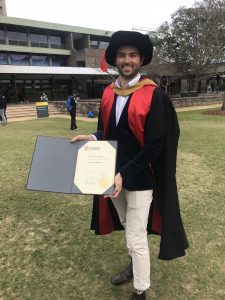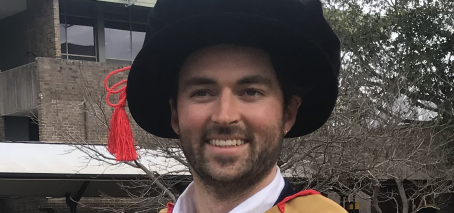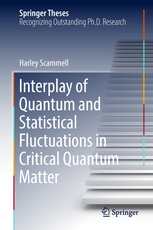Exciting new states of quantum matter enlisted to important environmental challenges
FLEET’s Harley Scammell’s outstanding PhD recognised by UNSW
The thesis “Interplay of quantum and statistical fluctuations in critical quantum matter” will be published by Springer in hardcover and ebook.
“It’s really great to have this research recognised by UNSW”, says Harley. “Hopefully, having the thesis published at Springer will make this work available to many others in the field. I’m excited to see what further work might come from this.”
Harley’s studies were in quantum magnetism, a subfield of condensed matter physics.
“I love this area of physics,” says Harley.
“A lot of my excitement toward this area stems from the possibility of predicting new states of matter – quantum matter – with characteristics far different than what we are accustomed to in everyday life.”
“This area of research has value beyond the merits of being theoretically intriguing,” says Harley. “The process of predicting, observing and ultimately controlling quantum matter is an important and ongoing direction of research for the sake of new and profound applications, technological or otherwise.”
“I particularly love the prospect of developing cutting edge technologies to assist in the fight against global environmental issues. I want to see clever, new technologies or approaches that reduce our excess energy wastage.”
“I’m attracted by both the fundamental science aspect, and the possible applications. Personally, I have been dedicated to this area from the point of view of theoretical curiosity, but I certainly enjoy the allure of the possible future technological applications that follow. I intend to continue working on related topics.”
Harley’s thesis was nominated as an outstanding PhD thesis by UNSW last month.
The thesis explores several aspects of strongly correlated magnetic quantum systems, e.g. quantum antiferromagnets, magnon Bose-condensates, and systems exhibiting deconfined quantum criticality. Such systems invariably require novel techniques or approaches in order to extract information from them.

“I love the prospect of developing cutting edge technologies to assist in the fight against global environmental issues” Dr Harley Scammell
In February, Harley Scammell was awarded a Fulbright Scholarship and has recently started work with world-renowned theoretical physicist Subir Sachdev at Harvard University on the mechanisms behind superconductivity – an exotic quantum phase of matter.
At FLEET, Harley worked with Oleg Sushkov (Research theme 1) on the theory of artificial graphene, an artificially-engineered semiconductor system that can be tuned to form robust topological (or Chern) insulating states.


